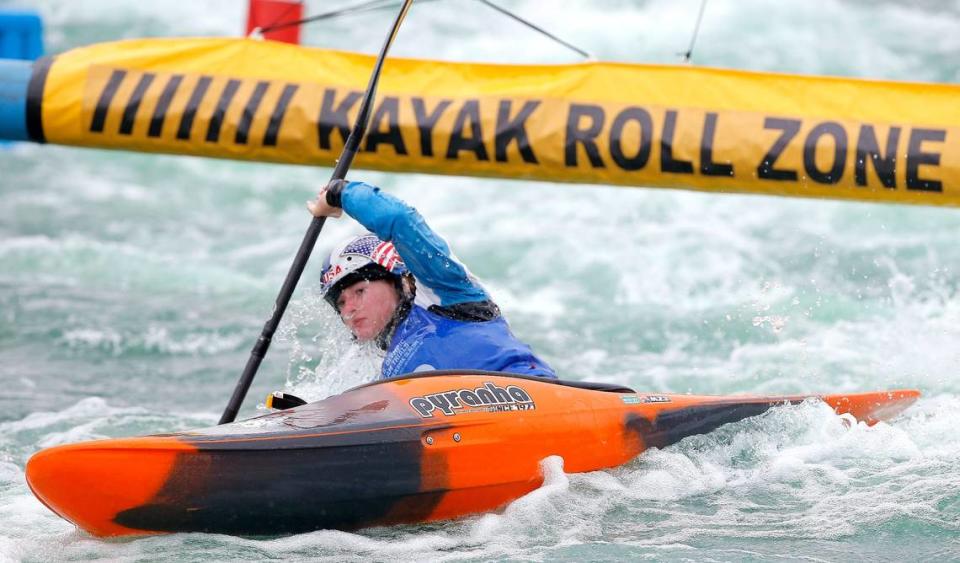How a hot pink kayak led NC native Evy Leibfarth on a path to the Paris Olympics
Evy Leibfarth’s kayaking story began when she was a toddler.
From a young age, Leibfarth, a Bryson City, N.C. native, was in the water, and her interest in kayaking followed quickly.
“Literally since I was like, one year old, my parents would take me down little rivers and lakes on their lap in the kayak,” Leibfarth said. “My parents got me my first kayak when I was four, and it was hot pink. I think that was most of my motivation to paddle — I just liked the color and gear, but then I really started to fall in love with it.”
The hot pink kayak hooked her, and her ambition has helped transform her into one of the country’s stars in the sport. She was only 14 years old when she became the top ranked female paddler in the U.S. A year later, she was a World Cup medalist, the youngest to accomplish that feat, and she competed in her first Olympic Games at only 17 years old. In the inaugural Olympics in Tokyo for canoeing, she was the youngest to qualify.
Now, at 20, she’s used to making history. Her first trip to the Olympics came in only her second season competing at the senior level. With that came stress, but Leibfarth took a lot away from it.
“I really didn’t have that much experience racing in general, but it was so amazing,” she said. “It was so inspiring to be around so many athletes from other sports — to get to be in the village. I really tried to savor every minute of it, but it was definitely stressful.”
Growing up along a river, she honed her craft while avoiding rocks and training at the Nantahala Outdoor Center (NOC).
After learning from Olympians as a kid, now she’s in those shoes, putting on her own Team USA uniform.
“It means a lot to me, especially growing up in the kind of river community that I did so in Bryson City,” Leibfarth said. “I feel like I spent the majority of my time growing up [there]. A big part of it was just the community around it — I want to say like 20 other Olympians came from training at the NOC and I was able to have all those people as role models growing up.”
A student at Davidson, Leibfarth is one of only three current students or alumni (Steph Curry and Caroline Queen are the others) in this Olympic Games. Leibfarth is going into her second Olympics with much more experience. She became the first woman to qualify for an Olympic Games in three different canoe/kayak events.
As a Pan-American Champion and U23 World Champion, not only will Leibfarth be competing in kayak (K-1) and canoe (C-1) in Paris, she will partake in a new competition — kayak cross. While the races are usually only about 90 seconds long, they all have unique components to them, especially kayak cross that’s making its Olympic debut in 2024.
“It’s a much different course — the gates are different, you’re allowed to hit the gates and you’re going down with three other people so it’s very much like a contact sport,” she said. “So that’s a lot different and that adds like a whole other element to think about.”

Leibfarth’s journey hasn’t been all smooth sailing.
She’s had to find avenues to support herself. Unlike a lot of professional and Olympic athletes who have partnership deals, athletes in smaller sports, including kayak and canoe, don’t have those same support streams.
But for 2024, finances haven’t been something Leibfarth has had to worry about like in years past, thanks to being a Women’s Sports Foundation Travel and Training Fund recipient.
“With kayaking being such a small sport, we don’t really get any support from our federation,” Leibfarth said. “So everything is pretty much self-funded or funded through the help of grants and sponsors. Getting the Women’s Sports Foundation grant has really helped me this year to be able to put all of my energy and focus on training for the Olympics.”
This sport is just one sign of growth for women at the Olympics and a full circle time for Paris. In 1900, Paris was the first Olympics to allow women to participate. This year will be the first Olympic Games to have equal representation between male and female athletes.
With success comes an extra layer of pressure, but this time around, Leibfarth is more focused on the experience.
“I think that going into this Olympics, as opposed to my last, I’m a lot less worried about the results I get and more focused on trusting the process and getting as much good training time as I can before the race.”
Anna Laible is a student with UNC Media Hub, a program with the UNC Hussman School of Journalism and Media, reporting from the Summer Olympics in Paris. She hosts the Speak Up Sports Podcast. Follow her journey covering her first Olympics on her Instagram (@anna_laible).

